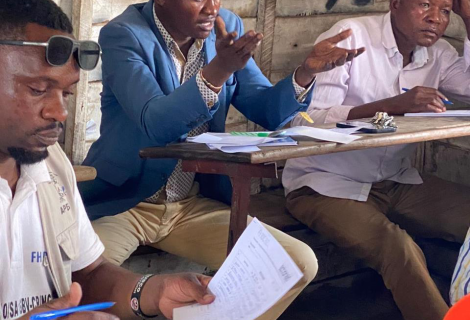Empowering Communities for Safer Shelter Construction: ActionAid DRC's Risk Reduction Planning Workshop with IDPs

ActionAid DRC Empowers IDPs to develop Risk Reduction Plans
In the conflict-affected regions of Nzulo and Bweremana, the need for secure, resilient housing is paramount. Recognizing this, ActionAid DRC recently conducted a series of workshops aimed at empowering local communities to build safer shelters. The workshops, held on April 5th and 6th, 2024, were integral components of the Shelter Multisectoral Assistance Project for people affected by violence in the Kirotshe Health Zones in Masisi Territory funded by Humanitarian Fund.
In the conflict-affected regions of Nzulo and Bweremana, the need for secure, resilient housing is paramount. Recognizing this, ActionAid DRC recently conducted a series of workshops aimed at empowering local communities to build safer shelters. The workshops, held on April 5th and 6th, 2024, were integral components of the Shelter Multisectoral Assistance Project for people affected by violence in the Kirotshe Health Zones in Masisi Territory funded by Humanitarian Fund.
Workshop Objectives and Participants
The primary goal of these workshops was to equip participants with the knowledge and skills needed to develop and implement effective disaster risk reduction plans in their shelter construction activities. A total of 60 community members participated, including 40 women and 20 men. Notably, the workshops also included five people with disabilities (three men and two women), ensuring an inclusive approach to community resilience.
Key Activities and Highlights
- Risk Identification and Assessment: Participants engaged in comprehensive discussions to identify potential risks associated with shelter construction in their areas. This included natural hazards such as floods, landslides, and earthquakes, as well as socio-economic challenges.
- Planning and Implementation: The workshops provided practical training on developing risk reduction plans. Participants learned to create actionable strategies to mitigate identified risks, focusing on sustainable building practices and community cooperation.
- Inclusive Participation: Special attention was given to ensuring that the voices of all community members, especially women and people with disabilities, were heard and integrated into the planning process. This inclusive approach fostered a sense of ownership and responsibility among participants.
- Capacity Building: Through interactive sessions and hands-on activities, participants gained valuable skills in safe construction techniques and disaster preparedness. These skills are crucial for building resilient shelters that can withstand future challenges.
Impact and Future Plans
The workshops in Nzulo and Bweremana marked a significant step towards enhancing the safety and resilience of shelters in these communities. Participants expressed gratitude for the practical knowledge and felt more confident in their ability to construct safe, durable homes. The success of these workshops underscores the importance of community involvement in disaster risk reduction and shelter construction.
ActionAid DRC remains committed to supporting vulnerable populations in conflict-affected areas. Moving forward, we plan to conduct follow-up sessions to monitor the implementation of risk reduction plans and provide ongoing support to ensure sustainable and safe housing for all.
By empowering communities with the tools and knowledge they need, we are building a foundation for a safer, more resilient future. Together, we can create a lasting impact and help those affected by violence rebuild their lives with dignity and security.
For more updates on our projects and initiatives, visit the ActionAid DRC website and follow us on social media.
Contact Information:
ActionAid DRC
Email: info@actionaiddrc.org